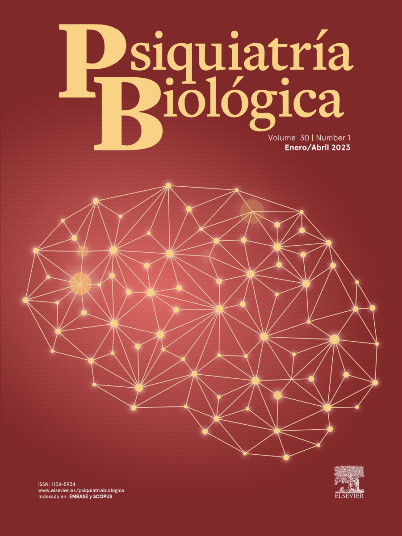Pregnancy has been described as a period of symptomatic stability for women diagnosed with eating disorder (ED). However, a poor control of alimentary symptoms before and during pregnancy is associated with higher risk of adverse effects during childbirth and the postpartum period. A case report is presented and a bibliographic review is carried out.
MethodsThe authors take the case of a 33-year-old woman diagnosed with anorexia nervosa during adolescence, who becomes pregnant at the age of 30. A non-systematic review was carried out using the Pubmed database using keywords [eating disorder] AND [pregnancy]. Studies of more than 5 years were excluded. The patient's informed consent was obtained. This work complies with the agreements of the Declaration of Helsinki.
ResultsEutocic delivery was carried out without incidents. Currently, the baby is 5 months old, his weight is adjusted to his age and his neurodevelopment is normal. Although the patient denies restrictions or purgative behaviors, she has lost weight in postpartum and has recovered her pre-pregnancy body mass index. No major affective symptoms have been observed in this period.
Discussion/ConclusionsPregnancy and postpartum period constitute periods of greater vulnerability in terms of eating symptoms in patients with EDs. Emphasis should be placed on a multidisciplinary approach with the aim of avoiding the appearance of associated risk factors both for the mother and the baby.
El embarazo se ha descrito como un período de estabilidad sintomática para las mujeres diagnosticadas con trastorno de conducta alimentaria (TCA). Sin embargo, un mal control de los síntomas alimentarios antes y durante el embarazo se asocia con un mayor riesgo de efectos adversos durante el parto y el posparto. Se presenta un reporte de caso y se realiza una revisión bibliográfica.
Material y métodosLos autores describen el caso de una mujer de 33 años diagnosticada de anorexia nerviosa (AN) durante la adolescencia, que queda embarazada a los 30 años. Se realizó una revisión no sistemática utilizando la base de datos Pubmed utilizando las palabras clave [trastorno alimentario] AND [embarazo]. Se excluyeron los estudios de más de 5 años. Se obtuvo el consentimiento informado del paciente. Este trabajo cumple con los acuerdos de la Declaración de Helsinki.
ResultadosFinalmente, fue un parto eutócico sin incidencias. Actualmente, el bebé tiene cinco meses, con un peso está ajustado a la edad y un neurodesarrollo descrito como normal. Aunque la paciente niega restricciones o conductas purgativas, ha perdido peso en el posparto y ha recuperado su índice de masa corporal (IMC) previo al embarazo. No se han observado síntomas afectivos importantes en este período.
Discusión/ConclusionesEl embarazo y el posparto constituyen períodos de mayor vulnerabilidad en cuanto a los síntomas alimentarios en pacientes con trastornos alimentarios. Se debe hacer hincapié en un abordaje multidisciplinar con el objetivo de evitar la aparición de factores de riesgo asociados tanto para la madre como para el bebé.







